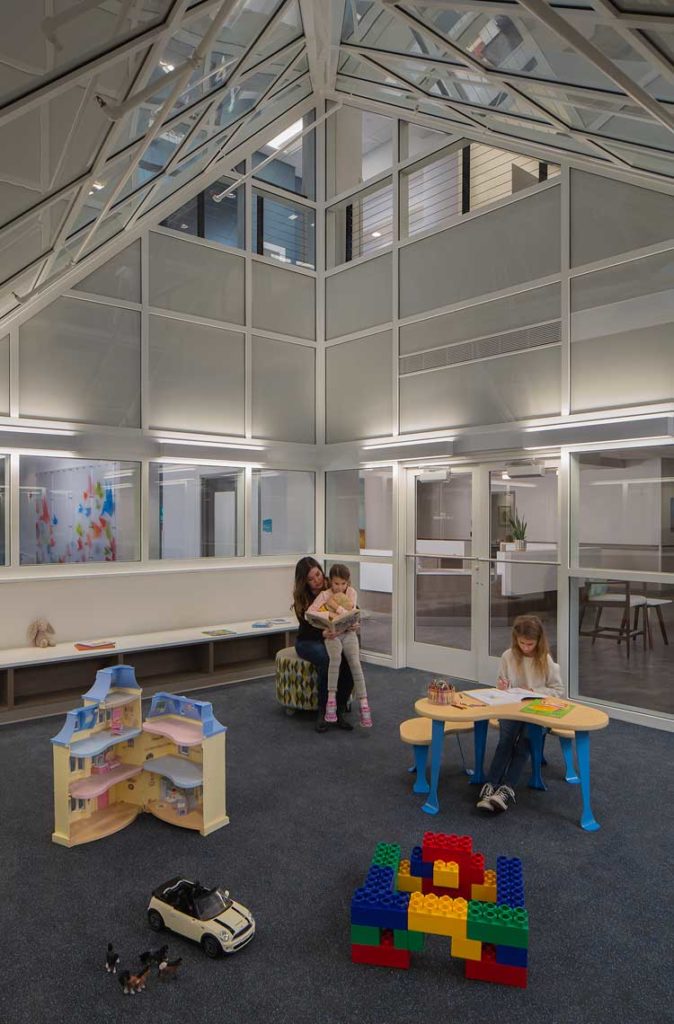
Several years ago, Nashville set out to be a national leader in combating domestic and sexual violence. That’s culminated in the new Family Safety Center, a $26 million building run by the city, where children can run around and play while adults get all the resources they need delivered to them — for free.
The first stop after clearing security is the waiting room, where clients are meant to relax and catch their breath. It looks like a living room — in fact, that’s what it’s called. There’s a fireplace, sofas, blankets, books, toys, snacks. The color scheme is soothing grays and blues, with pops of bright color in the stylish furniture.
To 11-year-old Aden Sabie, it looks “very fancy.” He and his sister are touring the center with their mother, a survivor of abuse who now helps other victims.
Nine-year-old Aris is hooked. She says she’d want to come every weekend and play. More importantly, she says the center would probably be a safe place for her mom, “like I feel like it could be my safe place.”
A kid wanting to hang out at a trauma facility, because of what is the heart of the building: a two-story-tall glass pyramid full of huge plush building blocks, toys and lots of space for jumping around.
Creating such a cheerful setting for kids, while adults file an order of protection, talk to detectives, or plan a safety strategy — that lifts an enormous burden, says their mother, Summer Sabie. She left her ex after years of emotional, financial and physical abuse — including being pushed out of a moving car — that she had to retell in front of her then-toddlers.
She says she remembers several moments of being very emotional and distraught.
“I wish that they had not seen so much. Because I feel like that that put a lot of stress on them.”
Which only added to her stress, especially when she finally went to the police.
“Speaking to an officer in a uniform, and even though you haven’t done anything wrong … just sitting there with your kids,” she says. “It was so painful, and I felt shame.”
Had there been a place for her kids to feel this welcome, Sabie says she probably wouldn’t have waited until she feared for her life to leave her abusive home.
Such a heavy focus on children is a key feature of Nashville’s Family Safety Center. Staff say it’s the largest of roughly 90 across the country, where more than a dozen groups and agencies were brought together to serve victims of sexual, child, domestic and elderly abuse.
The center’s executive director, Diane Lance, says that way victims don’t have to go all over the city for help. Today, they come to what she calls a “superstore of services.” Those include the Nashville Children’s Alliance, investigators from the state Department of Children’s Services, as well as representatives of several shelter providers: the Sexual Assault Center, the YWCA and Legal Aid Society, among others. The Metro Nashville Police Department’s sex crimes division and crimes against children division were also relocated next door.
Previously, victims had to go to those agencies separately, often by bus — a logistical nightmare that only added to trauma. Now the bus stops right in front the center on Murfreesboro Pike.
And people aren’t re-traumatized by having to tell their story over and over again. They sit in cozy support rooms and can speak to representatives of all the organizations at once.
That’s if they so choose, says Lance.
“If you’re coming here, and you need some help planning for your safety, but you don’t want to talk to police, or you don’t want to interact with the DA’s office, just yet or ever, that’s OK,” she says. “You’re in charge of the services that you receive here at our center, and we’re just here to help make sure the services are good.”
Everything at the facility is geared toward increasing client numbers and decreasing the rates of abuse, especially the grim statistic that Tennessee has one of the highest rates in the nation of women killed by intimate partners.
So every detail is thought out, even what seems like a design flaw — really loud white noise. Lance asked that it be embedded in the ceilings near the rooms where the most delicate conversations take place.
“Just imagine telling someone something awful that happened in your life and you hear people walking by bursting out laughing,” she says. “That’s a really bad feeling.”
Staff know it’s never easy to leave a violent situation, but a facility like this makes it easier. One day after the center officially opened last month, eight women walked in off the street, which is rare.
Summer Sabie can understand why. She thinks if the center had been around when she needed it, “it would’ve saved me a lot of grief and those feelings of shame. But it’s here for the next person, and that makes me feel good.”
Meanwhile, her kids are equally impressed by the center’s garden outside. Midway through explaining how amazing it is, and how he thinks everybody would love it, Aden is interrupted by his sister, who challenges him to race.
When they’re done, they promptly set about trying to figure out how to come back as volunteers, to work with other children.


